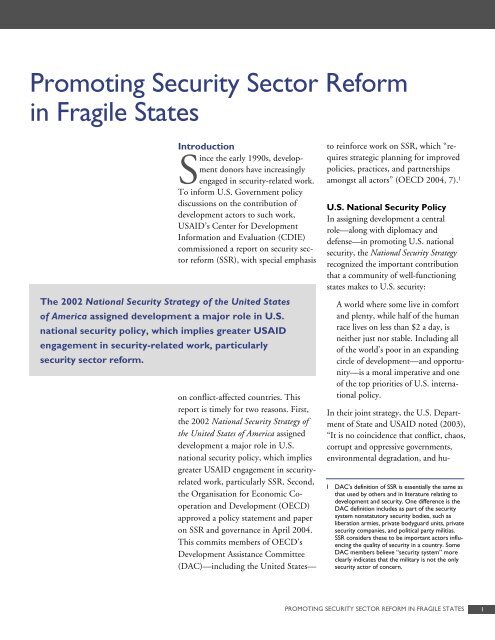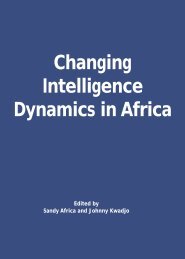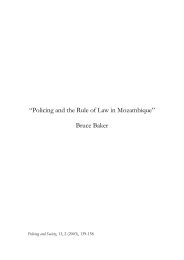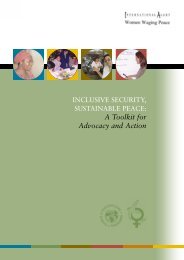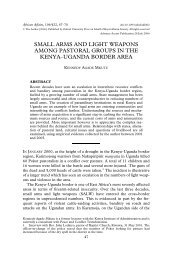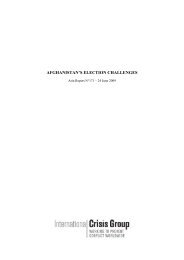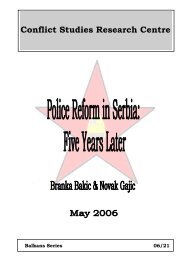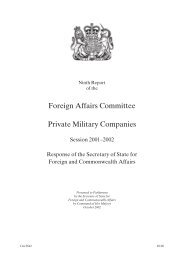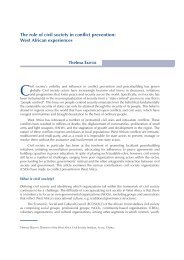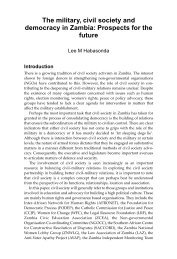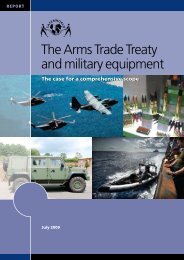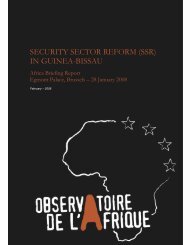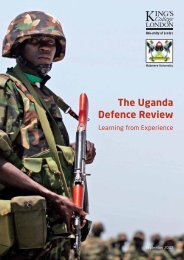promoting security sector reform in fragile states - GFN-SSR
promoting security sector reform in fragile states - GFN-SSR
promoting security sector reform in fragile states - GFN-SSR
Create successful ePaper yourself
Turn your PDF publications into a flip-book with our unique Google optimized e-Paper software.
Promot<strong>in</strong>g Security Sector Reform<br />
<strong>in</strong> Fragile States<br />
Introduction<br />
S<strong>in</strong>ce the early 1990s, development<br />
donors have <strong>in</strong>creas<strong>in</strong>gly<br />
engaged <strong>in</strong> <strong>security</strong>-related work.<br />
To <strong>in</strong>form U.S. Government policy<br />
discussions on the contribution of<br />
development actors to such work,<br />
USAID’s Center for Development<br />
Information and Evaluation (CDIE)<br />
commissioned a report on <strong>security</strong> <strong>sector</strong><br />
<strong>reform</strong> (<strong>SSR</strong>), with special emphasis<br />
The 2002 National Security Strategy of the United States<br />
of America assigned development a major role <strong>in</strong> U.S.<br />
national <strong>security</strong> policy, which implies greater USAID<br />
engagement <strong>in</strong> <strong>security</strong>-related work, particularly<br />
<strong>security</strong> <strong>sector</strong> <strong>reform</strong>.<br />
on conflict-affected countries. This<br />
report is timely for two reasons. First,<br />
the 2002 National Security Strategy of<br />
the United States of America assigned<br />
development a major role <strong>in</strong> U.S.<br />
national <strong>security</strong> policy, which implies<br />
greater USAID engagement <strong>in</strong> <strong>security</strong>related<br />
work, particularly <strong>SSR</strong>. Second,<br />
the Organisation for Economic Cooperation<br />
and Development (OECD)<br />
approved a policy statement and paper<br />
on <strong>SSR</strong> and governance <strong>in</strong> April 2004.<br />
This commits members of OECD’s<br />
Development Assistance Committee<br />
(DAC)—<strong>in</strong>clud<strong>in</strong>g the United States—<br />
to re<strong>in</strong>force work on <strong>SSR</strong>, which “requires<br />
strategic plann<strong>in</strong>g for improved<br />
policies, practices, and partnerships<br />
amongst all actors” (OECD 2004, 7). 1<br />
U.S. National Security Policy<br />
In assign<strong>in</strong>g development a central<br />
role—along with diplomacy and<br />
defense—<strong>in</strong> <strong>promot<strong>in</strong>g</strong> U.S. national<br />
<strong>security</strong>, the National Security Strategy<br />
recognized the important contribution<br />
that a community of well-function<strong>in</strong>g<br />
<strong>states</strong> makes to U.S. <strong>security</strong>:<br />
A world where some live <strong>in</strong> comfort<br />
and plenty, while half of the human<br />
race lives on less than $2 a day, is<br />
neither just nor stable. Includ<strong>in</strong>g all<br />
of the world’s poor <strong>in</strong> an expand<strong>in</strong>g<br />
circle of development—and opportunity—is<br />
a moral imperative and one<br />
of the top priorities of U.S. <strong>in</strong>ternational<br />
policy.<br />
In their jo<strong>in</strong>t strategy, the U.S. Department<br />
of State and USAID noted (2003),<br />
“It is no co<strong>in</strong>cidence that conflict, chaos,<br />
corrupt and oppressive governments,<br />
environmental degradation, and hu-<br />
1 DAC’s def<strong>in</strong>ition of <strong>SSR</strong> is essentially the same as<br />
that used by others and <strong>in</strong> literature relat<strong>in</strong>g to<br />
development and <strong>security</strong>. One difference is the<br />
DAC def<strong>in</strong>ition <strong>in</strong>cludes as part of the <strong>security</strong><br />
system nonstatutory <strong>security</strong> bodies, such as<br />
liberation armies, private bodyguard units, private<br />
<strong>security</strong> companies, and political party militias.<br />
<strong>SSR</strong> considers these to be important actors <strong>in</strong>fluenc<strong>in</strong>g<br />
the quality of <strong>security</strong> <strong>in</strong> a country. Some<br />
DAC members believe “<strong>security</strong> system” more<br />
clearly <strong>in</strong>dicates that the military is not the only<br />
<strong>security</strong> actor of concern.<br />
PROMOTING SECURITY SECTOR REFORM IN FRAGILE STATES 1


